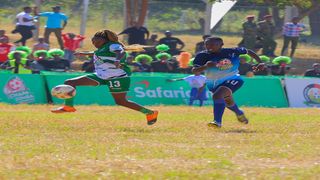
A match during the Chapa Dimba Na Safaricom Football Tournament.
|Telco’s generous sports funding a game-changer
What you need to know:
- The company has spent hundreds of millions in facilitating sports events.
- By working closely with Athletics Kenya, Deaf Athletics Association of Kenya and the National Paralympics Committee of Kenya, Safaricom has developed a strong athletics calendar that has resulted in local training opportunities for Kenya’s athletes.
Safaricom has been at the forefront of transforming the lives of sportsmen and women through sponsorship of several sporting events in the country for the last two decades.
The company has spent hundreds of millions in facilitating athletics events under the Safaricom Athletics Series banner, an improvement of the initial sponsorship of the Safaricom Gusii Golden Series launched in 2005.
The annual “Chapa Dimba na Safaricom” youth football tournament that was launched in 2017 has also continued to rise in popularity, churning out talent across the country, especially in the previously neglected places like Garissa.
The rise of Kenya Sevens rugby team in the World Rugby Series also stems from Safaricom’s sponsorship of the annual Safaricom Sevens and National Sevens Series from 2010 to 2016.
Kenya Rugby Union (KRU) chairman Oduor Gangla said Safaricom sponsorship completely turned around rugby fortunes with the National Sevens Series producing some of the finest players for the national team.
Gangla singled out former Kenya Sevens captains Oscar Ayodi and Jacob Ojee.
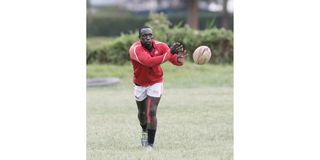
Oscar Ayodi.
Others are Alvin “Buffa” Otieno, who was a hit during the 2019/20 World Sevens Series, Augustine Lugonzo, Samson Onsomu and Bush Mwale.
“Sports not only needs partners like Safaricom to prosper but also sound management from federations. We must be accountable in all our undertaking. That is what I have managed to do since taking over,” said Gangla.
In the recent past, Safaricom has also been part of the East African Safari Classic Rally and the Magical Kenya Ladies Open golf tournament.
These two globally recognised events gave Safaricom an opportunity to showcase Kenya as a sports destination capable of hosting international competitions.
By working closely with Athletics Kenya, Deaf Athletics Association of Kenya and the National Paralympics Committee of Kenya, Safaricom has developed a strong athletics calendar that has resulted in local training opportunities for Kenya’s athletes, who use various local races to prepare for international engagements.
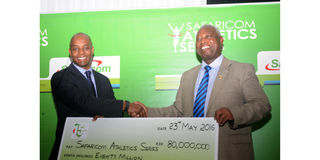
Safaricom Corporate Affairs director Stephen Chege (left) gives Athletics Kenya President Jack Tuwei a dummy cheque of Sh80 million in 2016.
These local competitions have played a key role in shortlisting talent for “Team Kenya”, which has gone ahead to perform remarkably well at global events, most recently at the 2019 World Athletics Championships, 2020 World Half Marathon Championships and also the 2016 Olympics and Paralympics in Rio de Janeiro, Brazil.
Launched in 2013, the Safaricom Athletics Series has transformed lives through sports, using road races along with track and field events to bring communities together while at the same time identifying and nurturing new talent.
The series have involved races ranging from community races, marathons to track and field events, which have allowed the country to witness first-hand the amount of sporting talent that Kenya is blessed with.
In 2015, Safaricom set aside Sh120 million for the season’s series that featured three categories - relays, track & field and long-distance races.
The track and field meets include junior athletics, national championships and national trials for various global competitions, including the World Championships and All Africa Games.
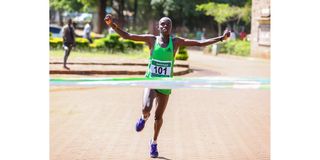
Elkan Yego celebrates as he wins the 2017 Safaricom Kisumu City Marathon, part of the company's athletics series.
It was at the 2015 World Championships in Beijing that Kenya made history by finishing top, overall, in the medal standings for the first time, with Julius Yego and the late Nicholas Bett handing the country its maiden victories in javelin and 400m hurdles, respectively.
In Beijing, Kenya claimed seven gold, six silver and three bronze medals.
Some of the long-distance race in the Safaricom series include the Deaf Marathon, Henry Wanyoike Run, Iten Half Marathon, Kisii Half Marathon, National Deaf Championships, Mombasa Marathon, Ndalat Gaa Cross Country, Madoka Marathon, Tegla Loroupe Peace Run, Imenti South race, Kisumu Marathon and the Oginga Odinga Memorial Race.
Safaricom’s sponsorship over the years also included the Safaricom Relay Series that culminated in the World Relay Championships in 2014 and 2015 in Nassau, Bahamas.
Great strides were made in rugby when Safaricom made a grand entry into game in 2009 with a three-year funding deal that saw the company fork out Sh25 million for the 2009 Safaricom Sevens, with then CEO Bob Collymore promising increased sponsorship each year.
Safaricom’s sponsorship that had reached Sh70 million annually to include the National Sevens Series continued until 2015 when the company announced that it would formally sever all financial ties with the KRU following allegations of financial improprieties and governance issues.
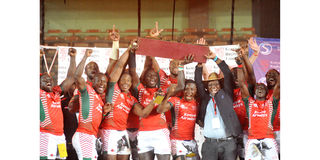
Kenya Shujaa players and Kenya Rugby Union chairman Richard Omwela at the end of the 2016 Safari Sevens rugby tournament.
A three-year deal between the two institutions was set to lapse in December 2015 but was called off months earlier, in April.
Nevertheless, the National Sevens Series had helped nurture players who would take places in Kenya Sevens team that went on to win the 2016 Singapore Sevens, their first event in the World Rugby Sevens Series, besides taking part in the 2016 Rio Olympic Games.
Chapa Dimba Na Safaricom is a national football tournament for male and female youth aged between 16 and 20.
The tournament aims to transform the lives of young people by giving them a platform to showcase their talent and an opportunity to earn from their passion.
Sh1 million
The tournament kicks off with a national registration in the following regions: Nairobi, Eastern, Western, Nyanza, Rift, Coast, Central and North Eastern.
Each team comprises 15 players and two officials for the group stages with proceeding teams, thereafter, allowed to recruit three additional players for the next level.
The winning team - both boys and girls - pockets Sh1 million each.
The youngsters get the opportunity to showcase your talent and stand a chance to get spotted by the Football Kenya Federation Talent Scouts to the National Under-17 and Under-20 teams.
At the end of the tournament, La Liga Scouts pick an All-Star team that gets to attend a 10-day boot camp, traditionally in Spain, and play against top La Liga youth teams.





